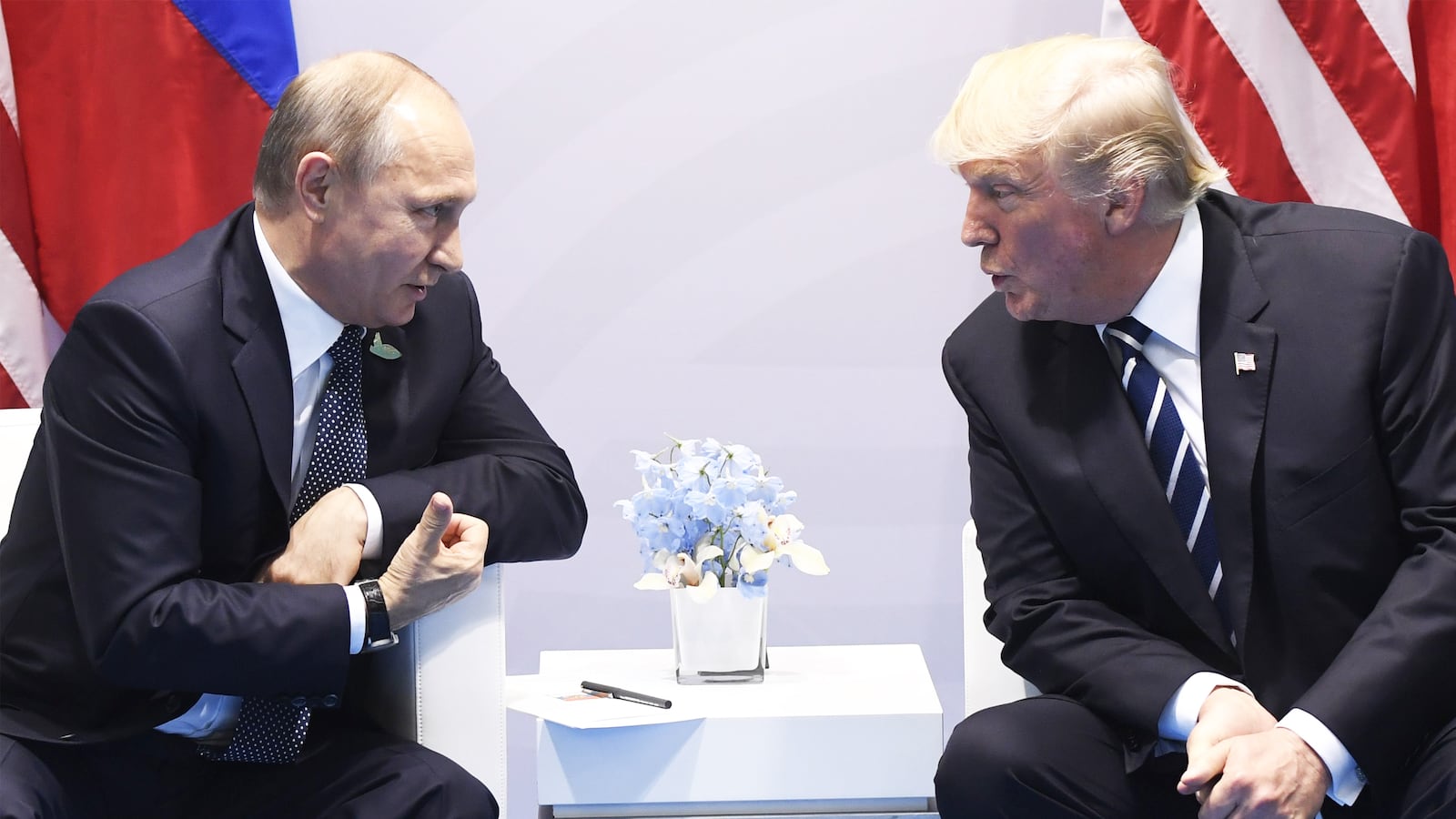Buried in the massive $1.3 trillion spending bill that Congress is considering this week are strict new punishments against Russia, in what lawmakers and aides say is a message to President Donald Trump to reconsider his relaxed posture toward Moscow.
The legislation, which Trump was always expected to sign, includes restrictions that bar many federal agencies from engaging financially or otherwise with the Kremlin and its backers on a number of fronts. Lawmakers from both parties viewed those provisions and others as an opportunity to enshrine new punishments against Vladimir Putin’s regime at a time when the Trump administration has taken heat for its refusal to immediately and fully implement mandatory sanctions and other punishments.
“Those [sanctions] were a good first step. But I do think that these newer sanctions hopefully put a little more bite to it. And frankly I think that’s a good thing,” Sen. John Thune (R-S.D.) told The Daily Beast. “The Russians are guilty of bad behavior all over the world. And so we shouldn’t be doing anything to encourage or condone that.”
The new measures come as the White House faces renewed criticism over its handling of Russia. Earlier this week, The Washington Post reported that the president, against the advice of his top aides, congratulated Putin on winning re-election to another six-year term. He also did not press Putin on election-meddling or on the nerve-agent attack on a former Russian spy in the United Kingdom.
Multiple lawmakers and congressional sources from both parties said the new financial barriers aimed at punishing Russia are both robust and significant, and were crafted in light of Russia’s continued aggression in eastern Europe and the Middle East in addition to the likelihood that the Kremlin tries to meddle in the 2018 midterm elections.
Democrats pointed to Trump’s reluctance to publicly criticize Putin and speak out about Russia’s activities, and said it was necessary for Congress to step in whenever possible to send the administration a message.
“With the appropriations bill, bipartisan majorities are once again sending the president tough new measures to push back on Russia and shore up our election system against future interference,” Rep. Eliot Engel (D-N.Y.), the top Democrat on the House Foreign Affairs Committee, told The Daily Beast. “It’s time that the White House listens to Congress and uses the tools we’ve provided.”
The spending bill bars the use of federal funds for “enter[ing] into new contracts with, or new agreements for Federal assistance to, the Russian Federation,” and allocates $250 million to the Countering Russian Influence Fund—a 150 percent increase from last year. Additionally, it authorizes significant new sanctions against Russia over its actions in eastern Europe and the Middle East.
Their origin, though, remains a mystery. While lawmakers were unsure who exactly inserted those measures into the 2,232-page spending bill, they said it represented a broad point of agreement among Democrats and Republicans on Capitol Hill in a policy area where Trump himself has, in their view, struggled.
“I think there is broad bipartisan concern that our president hasn’t been active in pushing back against Russian aggression—either its meddling in our last election and likely meddling in our next election, or its aggression toward its neighbors like Ukraine, Georgia and its interference in Syria,” Sen. Chris Coons (D-DE) told The Daily Beast.
Coons, who sits on the Senate Appropriations Committee, said the language was “most likely added by senior senators who recognize that the Congress has acted forcefully and in a bipartisan way to demand sanctions and stronger action by the president and [we] have so far been largely disappointed. I think this is partly an effort of senior legislators from both parties to make progress on that.”
Sen. Johnny Isakson (R-GA) described the spending bill as a “wheelbarrow” of Congress’ priorities, and said he suspects the additional measures were included “in response to what’s been going on up here,” referring to mandatory sanctions against Russia that continue to receive bipartisan backing.
“Because it’s an omnibus appropriations bill, that’s the logical place for that type of language to be,” Isakson said.
Despite Trump’s apparent unwillingness to outwardly criticize Putin and Moscow’s election-meddling practices, lawmakers on both sides of the aisle have credited the Trump administration for taking actions against the Kremlin including a new lethal defensive weapons sale to Ukraine’s military, which is defending itself against Russian-backed separatists.
The omnibus includes financial punishments against Russia over its annexation of Crimea, which the U.S. and its allies have condemned. The legislation also includes a five-page section titled “Countering Russian Influence and Aggression,” which outlines specification prohibitions on federal dollars going to the Russian government.
Additionally, federal agencies are barred from directing financial assistance toward countries that are supporting Russia’s annexation of Crimea. The bill also restricts federal agencies from investing in Crimea or other areas that the U.S. believes are under illegal control by Russia, and requires Treasury Secretary Steven Mnuchin to direct Americans sitting on international financial boards to vote against any measure that funds programs which violate “the sovereignty or territorial integrity of Ukraine.”
More broadly, the legislation directs funds toward “supporting democracy programs” in Russia including Internet freedom. It also allocates $380 million to the Election Assistance Commission to help states and localities improve their election infrastructure to guard it against cyberattacks. The Senate Intelligence Committee issued a series of recommendations this week on election security as part of its Russia investigation.
“It is reassuring that at least in this bill, we still have a bipartisan consensus with regard to national security issues,” Sen. Brian Schatz (D-HI) told The Daily Beast, speculating that Congress was aiming to “protect [Trump] from himself” by slipping in new punishments against Putin.





